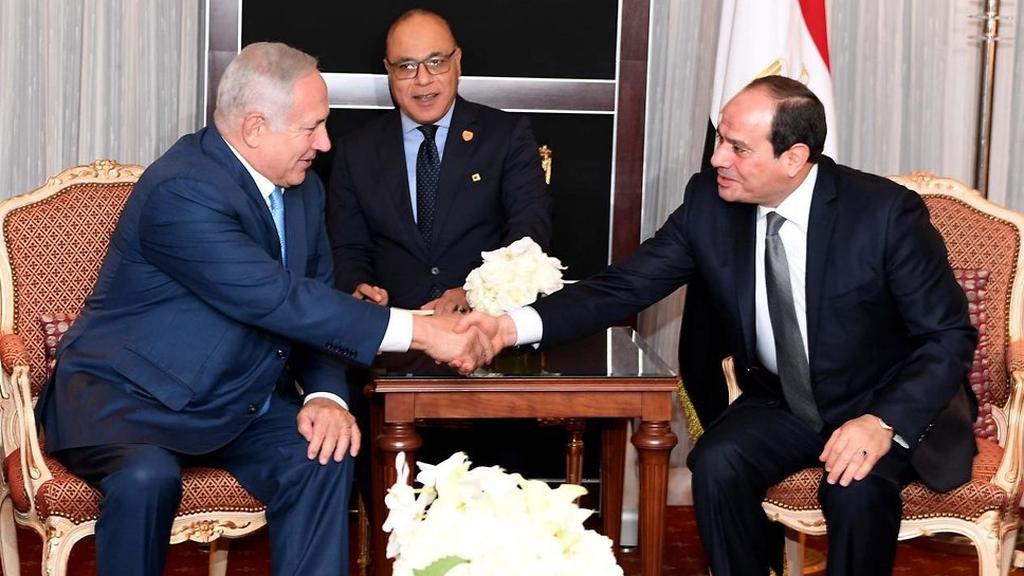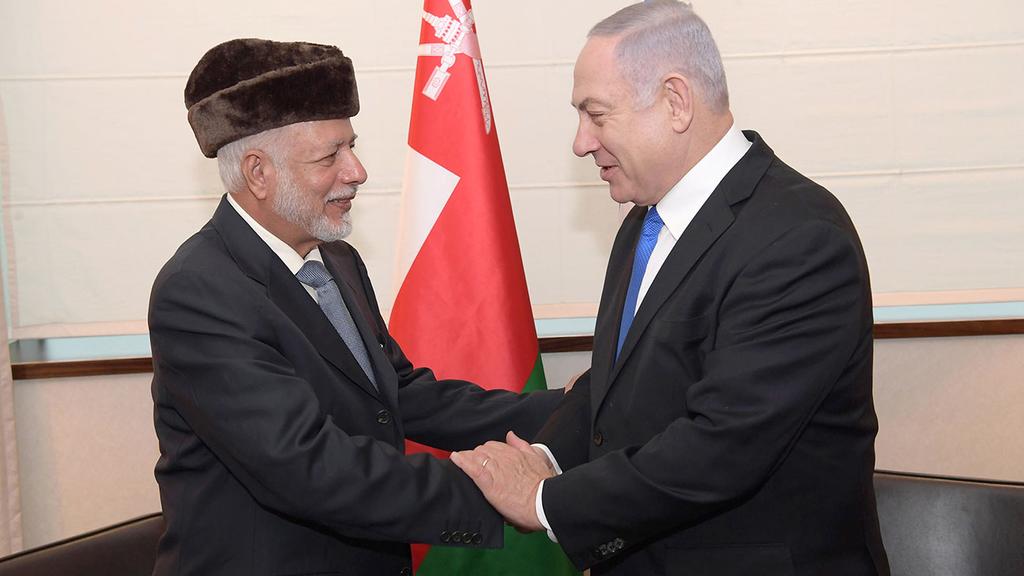CAIRO – Officials in the Egyptian capital are hoping that Prime Minister Benjamin Netanyahu can leverage his party’s first-place election finish to secure a parliamentary majority and continue as one of the Egyptian regime’s essential partners in the region.
“Remember that Egypt entered the Camp David Accords with a right-wing Israeli government,” says Mustafa Kamal, a researcher for the quasi-governmental Al-Ahram Center for Political and Strategic Studies.
“And only the events of the Arab Spring overshadowed the Egyptian-Israeli cooperation at the security level.”
4 View gallery


Prime Minister Benjamin Netanyahu meeting with Egyptian President Abdel Fattah el-Sisi in New York
(Photo: GPO)
The Netanyahu government asked Washington not to cut aid to the administration of Egyptian President Abdel Fattah el-Sisi after the June 2013 revolution that ousted Muslim Brotherhood-affiliated President Mohamed Morsi.
That milestone was characterized by officials of the Obama administration as a “coup-like event,” much to the chagrin of a stability-focused Egyptian leadership.
Sisi credits Netanyahu for successfully lobbying the Obama administration to lift its hold on the supply of F-16 aircraft, Harpoon missiles and Abrams tanks by 2015.
“Egypt and Israel continued to deepen their coordination to curb terrorist operations in Sinai, which served as the first test for Sisi,” says Kamal.
“More recently, the Egyptian administration was able to solve the issue of compensation for the lost supply of natural gas to Israel during the height of the Sinai terror campaign. And this year, we brought Israel into the East Mediterranean Gas Forum agreement.”
Last month, natural gas started flowing to Egypt from Israel’s Leviathan offshore gas field, a vital part of an effort coordinated with Washington to help it become a regional energy hub.
4 View gallery


Israel's Leviathan gas field is supplying natural gas to Egypt
(Photo: Elad Gershgoren)
“In some ways, Netanyahu opened the door between the Egyptian regime and the current American administration,” says Mkhaimar Abusada, a political scientist at Al-Azhar University in Gaza. “The Egyptians believe they will benefit, at least economically from Trump’s ‘deal of the century.’”
“Cairo is more comfortable dealing with Netanyahu, whom they have known for years, unlike Benny Gantz, who has no political experience and doesn’t know what to do with Gaza, the Palestinians and the wider Arab world,” says Abusada.
A company affiliated with the Egyptian security apparatus has a substantial stake in the pipeline operator, with the remaining half ownership divided between Texas-based Noble Energy and Israel’s Delek Drilling company.
“I have been following Netanyahu for years, and despite some reservations, I have to say he was able to establish strong and real relations between the Arabs and Israel,” says Sara Sherif, Israeli affairs editor at the Cairo daily Al-Dustour.
“We have to acknowledge that the [predominantly Arab] Joint List achieved success by obtaining 15 seats, but I doubt they will be able to prevent the formation of a new Netanyahu government and anyway they do not play a role in the conduct of relations between Israel and the Arab states,” she says.
4 View gallery


Joint List head Ayman Odeh celebrates his party's strong showing in the March 2 elections
(Photo: Gil Nachshon)
While ruling circles in Egypt have accommodated themselves to Netanyahu, widespread discontent with the extent of concessions expected from the Palestinians under the Trump vision stirs grumblings from students and intellectuals.
“Generally Arabs say that the Israeli agenda is the same no matter who is their prime minister,” says Hassan Khalifa, a 22-year-old undergraduate student of Semitic languages at Cairo University.
“But I think if Gantz were to lead their government, he would be less likely to take Al-Aqsa [Mosque] and the Palestinian lands on the Jordan River,” Khalifa says.
Alexandria resident Amin El-Mahdy is one of the few progressive Egyptian political commentators who has been published in Hebrew.
A participant in the long-suspended people-to-people initiatives of the early 1980s, El-Mahdy views bitterly a relationship reduced to energy deals between elites and mutual arrangements solely focused on identifying terror suspects.
4 View gallery


Benjamin Netanyahu and Omani Foreign Minister Yusuf bin Alawi bin Abdullah
(Photo; GPO)
“Netanyahu achieved great regional gains for Israel but that success was based on collaboration with fascist, collapsing Arab regimes hostile to their people, to the Israeli people, and to Jews, as well,” says El-Mahdy.
“Netanyahu is aligned with Arab criminal rulers who are foes of democracy and enemies of peace between peoples. It’s an alliance between the forces of expansion and settlement in Israel and the Arab fascist camp,” he says.
“The traditional Left in Israel collapsed long ago. But the concept of the Left itself has changed and it is inspiring to see Israeli Jews support the [majority-Arab] Joint List and show brave hearts and minds to reach the most important elements of peace and cooperation.”
“Netanyahu’s affinity for Arab criminal rulers continues to harm the true supporters of peace in Egypt and the wider Arab world. Progressives on both sides need to imagine how to counter the alliance between the forces of expansion and settlement in Israel and the Arab fascist camp,” El-Mahdy says.
Article written by Mina Nader. Reprinted with permission from The Media Line

